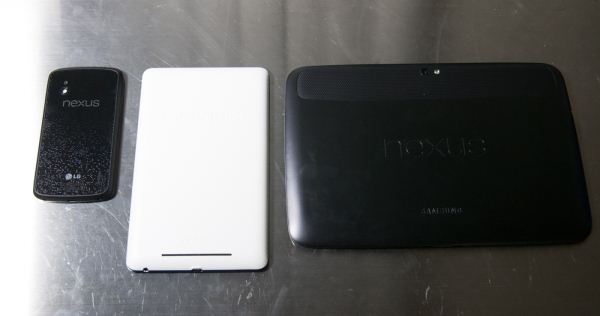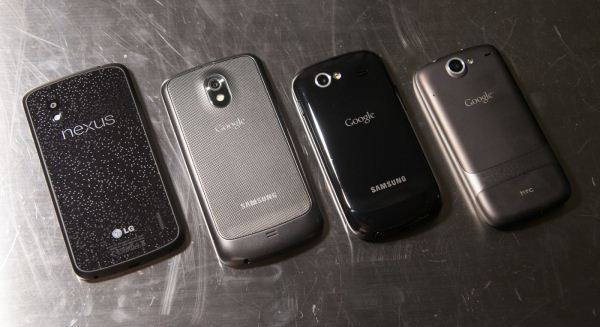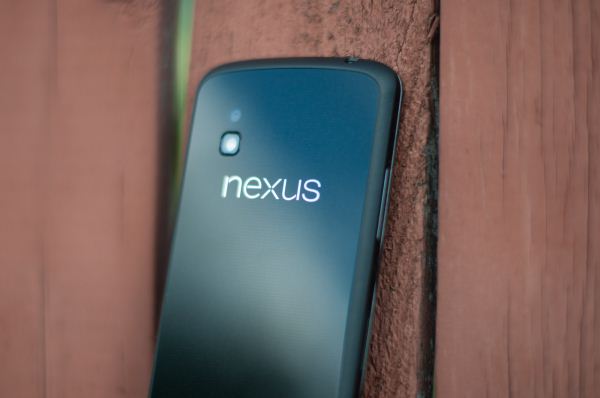Google Nexus 4 Review - Google's new Flagship
by Brian Klug on November 13, 2012 8:45 AM EST- Posted in
- Smartphones
- LG
- Android
- Mobile
- APQ8064
- Nexus 4
- Android 4.2
- MDM9215
With the Nexus 4 conclusion I really have to finish the way I started, namely by noting that this is now the fullest realization of Google's original strategy laid out for Nexus at its inception. The Nexus One had extremely aspirational goals for a first-gen Googlephone — it tried to change the way that phones are sold in the US and tried to deliver a fully carrier-agnostic reference platform for developers and OEMs to build out from. The end of that story is something everyone is familiar with, however — the Nexus One was largely a commercial failure. Little did we all know it would take several more iterations of the Nexus hardware and Android platform to get close to delivering on those goals, and Google has inched closer each time.
The next revisions of Nexus built on this platform, but only with Galaxy Nexus and its pentaband WCDMA radio and Nexus 4 do we see the fullest realization of this dream. Over time Google has built up the infrastructure required to deliver on its goals with things like the Play Store, a reputation among hardware vendors, and the right combination of hardware and software cadence to make this all work. The price point with the Nexus 4 is now low enough to not make off-contract sale an impossible to swallow deal.
With the Nexus 7 I felt like we were truly seeing the Nexus line come into its own. With Nexus 4 and 10 we're now seeing Google finally deliver a product lineup with offerings in each of the major size tiers. We now have a form factor of device for every two inches of diagonal difference.
With the Optimus G, LG truly went all the way toward delivering the best of everything it had to offer from all the different parts of LG — LG Chem, LG Innotek, LG Display. I'm very positive about the Optimus G hardware and very positive about the Nexus 4 as its close relative. LG's execution in the smartphone space has primarily been held back by its software approach and skins, and until recently a lack of updates. Getting a win for LG in the Nexus space basically mitigates that, as the software burden becomes entirely Google's, and obviously Nexus will continue to mean the latest and greatest Android platform updates for quite some time.
You can go back and read what I've written about the Nexus 4 hardware — in a word it's superb. In-hand feel is awesome thanks to the rubber ring running around the perimeter of the Nexus 4, and build quality is also very good. I've fully disassembled my Nexus 4 three times and put it together without issue, and the Nexus 4 has taken a few trips to the floor (my fault) without any adverse effects.
Finally, there's also the matter of price. For $299 you can get the latest and greatest hardware and 8 GB of storage, and for $349 you can get double that storage with 16 GB (12.92 GB usable). Both are fully unlocked and carrier-agnostic, and at those prices the Nexus 4 pretty much blows the doors off of any other unlocked or out of contract smartphones, which usually end up being priced at around $600 or more.
If you're an Android enthusiast, the Nexus 4 is obviously the phone to have right now. The combination of APQ8064 and MDM9x15 is excellent in spite of some unfortunate thermal throttling, and we'll be seeing many more Fusion 3 based devices in time at prices well above the Nexus 4 out of contract. At a fundamental level there is quite literally no better vehicle out there for Google to communicate its smartphone platform via than the yearly Nexus refresh. On its own, the Nexus 4 would otherwise be phenomenally great hardware. As a Nexus, it's a level even beyond that.
Google has come an exceptionally long way since that first Nexus One.













188 Comments
View All Comments
Freedomuser - Wednesday, November 14, 2012 - link
Not so fast. If the tests suite was intense like i think it's then even iphone 5 will get overheated.So, the question is, does any other phones in your chart survived the tests suite? LG Optimus G dropped out. Nexus 4 made it through with overheat. What about others on your chart?
meloz - Thursday, November 15, 2012 - link
>>Not so fast. If the tests suite was intense like i think it's then even iphone 5 will get overheated.But in this test it did not. And in any benchmark in which iphone5 will overheat, the Nexus 4 will overheat and throttl even worse!
I want Android and Nexus to do well, because they represent a more user-friendly (freedom) choice to iphone. But Google seriously need to address overheating, battery life and other such fundamental issues. Nexus 4 is a crappy device, at any price. I hope future software/firmware updates mitigate some of the problems.
piroroadkill - Thursday, November 15, 2012 - link
I don't care if this is the best phone ever, they've made a big mistake by missing out the microSD slot.Mugur - Thursday, November 15, 2012 - link
Just a small mistake in article: "First, audioflinger is set to 48 kHz which results in software resampling causing artifacts for 41.1 kHz source material.". It should be 44.1. not 41.1, I think...Mugur - Thursday, November 15, 2012 - link
Running a 3D game for one hour is one thing, but throttling in a benchmark does not look good.tipoo - Monday, December 24, 2012 - link
Yeah...I wonder if tiny heatsinks in it would solve this, and become a norm as phone SoCs aim for higher and higher performance.cyberguyz - Thursday, November 15, 2012 - link
Seems Google has a problem with allowing the user to expand his storage beyond what they give you. Why is that?The phone comes with 16gb internal flash memory, but no way of expanding it. This seems to be a popular trend with all Google-branded Nexus devices (Galaxy Nexus and Nexus 7 tablet are the same). The lack of sdcard support in an Android device kills the ability to set up a Windows drive letter for it. Without that drive letter many popular programs like Calibre have an issue attaching to the device to manage things like ebooks (this is a real pain in the ass with my nexus 7!!). I for one like the freedom popping in another 64GB microSD card gives me.
The lack of a removable battery also hurts this phone. I have hard experience with the life of li-Ion batteries losing capacity over time in laptops. Every couple years I have to get new batteries because the Li-Ion battery loses capacity until it cant keep my laptop alive for more than 20 minutes without dying. I like Samsungs because I can always replace the battery cheaply when it goes south and I don't have to send my phone (and private data) away for servicing to do it.
Beyond these two (as I consider them major) gripes, this is a really nice phone.
funky247 - Thursday, November 15, 2012 - link
With regard to the non-removable battery issue, most of the people I know don't like non-removable batteries because it limits their ability to whip out a backup battery when they need the extra juice while they're no the go.However, if the issue is with replacing the battery as it gets older, you can do it yourself! It even tells you how to do it in the review. You can buy authentic OEM batteries off of Ebay and do everything yourself, with the right tools. Some sellers will even ship the tools!
cyberguyz - Monday, November 19, 2012 - link
There are both of those issues with non-removable batteries.While the article tells you how to change the battery yourself, they do not mention that if you do that, you void your warranty (granted the warranty is gone after the battery goes south anyway). There are a lot of folks that cringe at the though of splitting open their $500-600 US phone to replace a battery.
I for one don't keep a #4 torx screwdriver around.
The ability to whip in a new battery in 2 sec without special tools in a vendor-blessed manner is a bit plus to me.
Now if only Samsung (or anyone else - I'm not a brand fanboy) would put out an Android-based phone with quad-core Krait or A15, 2GB memory, 32GB expandable storage and user-replaceable battery, I would ebay my SG3 in a heatbeat and be all over it.
Brandy123 - Thursday, November 15, 2012 - link
What I don't get is although the price and specs are very attractive for an unlocked: no contract phone, 8 or 16GB is really small by today's standards when there is no microSD slot! Google is obviously assuming you will be connected to the net 24/7 and streaming your music and videos via Google Play and other services. But then your data usage goes through the roof! Will this aggressive pricing force more carriers to offer truly unlimited data plans and more reasonable prices?Also, HPSA+ is fast enough for most, but lack of LTE is another compromise to get that good price. Yet it still is "the buzz" (note that the sellout time means nothing without knowing the number of units sold.)
So maybe the other key to the popularity of this device may be that with the younger generation, their phone is sort of a status symbol to them. Who can wait 2-years for contract renewal to get a new phone? But who can afford a $900 iPhone with no contract? BAM - Nexus 4 - I can get the latest gadget with specs good enough to brag about, with no contract, and without having to eat Top Ramen for a month to afford it. Who cares it doesn't have enough memory to store my video, photos and MP3 collection. I'll put it all on the Cloud and run my data usage through the roof instead.